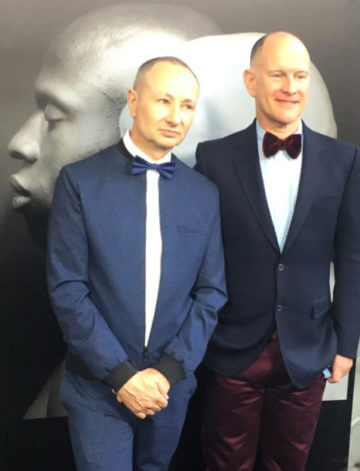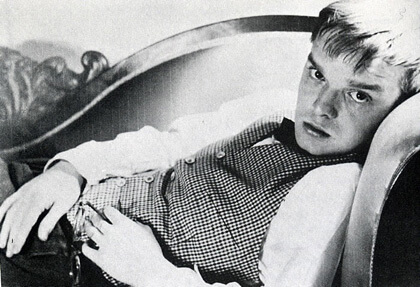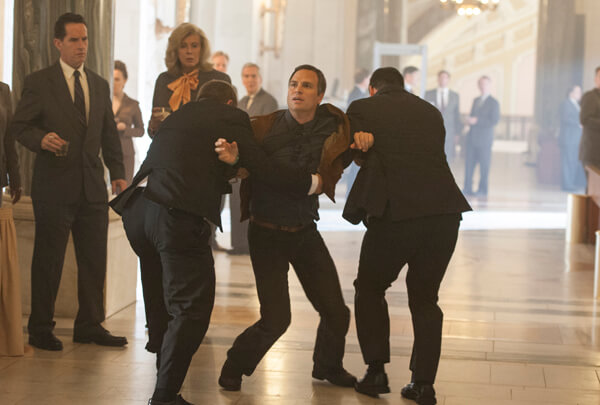James Lecesne in his one-man show “The Absolute Brightness of Leonard Pelkey” now at the Westside Theatre through September 26. | MATTHEW MURPHY
Last winter, “The Absolute Brightness of Leonard Pelkey,” James Lecesne’s gripping solo show recounting the tragic disappearance of a flamboyant gay teen in a small Jersey Shore town, got raves during its sold-out stint at the cozy performance space at Dixon Place.
Now the production, under the expert direction of Tony Speciale, has found a larger home Off Broadway at the Westside Theatre. The captivating Lecesne, who has written and performed other solo shows like “Word of Mouth,” slips effortlessly among an assortment of oddball, deeply etched personas.
“I’m excited to get back to it, be inside of it, to be sharing it,” he enthused. “I do this without any sets or props or costumes to speak of, so people get to use their imaginations. They get to be set designers and costume designers. I’m eager to be part of that collaborative experience.”
James Lecesne brings his novel about a gay teen gone missing vividly to life
Lecesne plays a gruff detective named Chuck who has a habit of quoting Shakespeare, then shifts to Ellen, the 14-year-old boy’s reluctant guardian who runs a beauty salon, then Phoebe, her smartass daughter, and also a host of oddball locals whose lives Leonard has touched in some way. Leonard, it should be noted, does not make an appearance. It’s left to us to conjure our own portrait of the unlucky teen for ourselves.
Lecesne is quick to point out that the show has evolved little from its incarnation at Dixon Place.
“So much of it worked, we didn’t want to mess with it, in terms of structure or content. We did minor changes to the container that it’s in — how it looks, adding a few more visual effects. We want to keep the integrity and simplicity, but, you know, be a little more Uptown.”
When I first saw the show, the characters were portrayed so vividly I was convinced it was based on an actual case. It wasn’t until I tried to research it online that I realized it is pure fiction. This is no surprise to Lecesne. He’s had many people come up to him saying, “It’s a true story, right?”
It’s actually based on his young adult novel “Absolute Brightness.” What inspired him to translate the work to the stage?
“The book was written in 2007, before the media was all over the bullying thing, the ‘It Gets Better’ initiative,” Lecesne explained. “I felt I wasn’t finished with the story, or rather, the story wasn’t finished with me. I wanted to talk to an adult audience. There were not many opportunities to address these issues in public in a thoughtful way. That was my goal. I was aware of other cases that were not exactly the same but had elements of Leonard Pelkey.”
Lecesne, as it happens, is no stranger to teen trauma. He is co-founder of the Trevor Project, the leading national group focused on suicide prevention and awareness among LGBTQ youth. His groundbreaking short film “Trevor,” about a troubled gay teen, won an Oscar in 1995.
Playing against expectations, Leonard comes across not as some kind of saint, but a kid with flaws — he’s stubborn and, as one character puts it, “a little too in your face.”
“One of the things I learned through the Trevor Project is that a young person’s job is to try new things and experiment,” said Lecesne. “Their brain is constructed to take chances and their prefrontal cortex loses its ability to perceive consequences of actions. This is scientifically proven. Teenagers can really be annoying for that reason. They push the boundaries in a world we have already decided upon. Leonard is forcing people in his community to do what’s right.”
Partway through the drama, the mystery of what happened to Leonard is solved, though the question of why is not fully answered. Will some theatergoers leave unsatisfied?
“If they do, then I don’t know what’s wrong with them,” huffed Lecesne. “You can’t always know the ‘why’ when it comes to evil. You can look at people all you want but you’re never really sure. You find reasons, but it’s really more important how people deal with that evil. It’s not spelled out, but people get it.”
Chuck is a hard-boiled detective with a soft center, and Lecesne admits he shares certain quirks with Chuck and all of his characters or he wouldn’t be able to pull it off.
“I like Chuck and I know him,” Lecesne said. “I’ve known hundreds of versions of him, having grown up in New Jersey. There are plenty of men with good hearts, just doing their jobs, everywhere. But you don’t hear about them so much. You hear about the obnoxious, loudmouth ones.”
One message comes through loud and clear: we often don’t recognize someone’s special qualities until they leave us. Lecesne believes it’s particularly heartbreaking when we hear news of an LGBT youth suicide.
“They are living their lives and suddenly they’re gone,” said Lecesne. “Why didn’t people appreciate them when they were alive? The circumference of their absences finds a presence that was in our lives up until when they left. That’s what’s so hard to bear.”
“Ultimately it’s what we leave behind,” Lecesne continued. “It’s what Leonard left behind, it’s what he did for that town. He made them question their lives. He brought love into Chuck’s life. He inspired them to make the world a better place. Not to be too Pollyanna about it — we must make the world a better place. It doesn’t get better on its own.”
Like many worthy endeavors, the Trevor Project was founded serendipitously, stemming from the HBO film.
“We wanted to put a hotline number at the end of the film, in case there was a kid who recognized themselves in the character of Trevor,” Lecesne explained. “When we did the research, we were surprised that none existed. So we had to put one together in just three months. [After] that first broadcast on HBO, we got over 1,500 telephone calls. We were shocked so many kids needed this.”
These days, in addition to the 24-hour hotline, the Trevor Project has embraced new technology with TrevorSpace (a social networking site), TrevorChat instant messaging service, and TrevorText. According to the group’s website, the hotline receives 45,000 lifeline calls in a year.
“I don’t know if I should be happy because more people are accessing the lifeline, or worried that the need is still so great,” Lecesne said. The production of “The Absolute Brightness of Leonard Pelkey” will donate $5 directly to the Trevor Project for each full price ticket sold.
According to Lecesne, much progress to address LGBT suicide has been made since the Trevor Project was founded, but there’s more to be done.
“People will be staggered to understand how deeply young people are suffering,” he said. “It’s our job to listen to their questions. I don’t think there’s enough of that. We get calls from teens who have no parents, teacher, counselors, or any relatives. It’s a lifeline to their own life.”
With cyberbullying on the rise in recent years — the heartbreaking story of Tyler Clementi is a testament to that — Lecesne clarified that addressing bullying is not a key focus at the Trevor Project, although it comes into play.
“We listen to stories about bullying,” he said. “But our hearts are open to both the person being bullied and also the bully,” explaining that the bully is often suffering, too.
“It’s the responsibility of adults to set the tone of no tolerance in schools, workplaces, and in their own lives,” Lecesne said. “No torture, thank you very much. Studies have shown that when adults won’t tolerate it, the kids won’t tolerate it either.”
In an age where gay marriage is now a reality, support is readily available, and highly visible initiatives like the “It Gets Better” videos exist, why are gay teens still taking their own lives? Lecesne’s answer is that outside of enlightened urban bubbles like New York or San Francisco, much of the country is way behind in attitudes toward homosexuality.
“A lot of kids live in areas where the church and government are calling them sinners and perverts,” he said. “And this is done more visibly than when I was a kid. Now you hear ministers saying homosexuals should all go to hell. There’s so much more hate speech. And these young people are listening.”
One of the play’s central messages — “It’s okay to dare to be different” is now a staple on Broadway these days, as evidenced by Tony winners like “Kinky Boots” and “Fun Home.” Lecesne believes these shows not only help change minds, they change hearts.
“That’s what theater is so great at,” he said. “People find themselves feeling something they weren’t expecting.”
Lecesne said that even if kids don’t actually see the show, just knowing it’s out there is important. He also hopes his solo show communicates an uplifting message of pure love, pointing out that at 14, Leonard had no sexual experience yet.
“For him it’s not about sex. Its about love,” Lecesne said. “We can stop having sex with people, but we can’t stop who we love. His love is all over the place. It gets into everybody. The hatred that’s directed toward these young people, and to homosexuals in general, it’s almost a hatred of love.”
He added, “One of the great achievements of the gay rights movement is that it’s wrested away from the patriarchy this idea that marriage is an economic contract. That model is pretty much gone. [Marriage] is a romantic contract that involves sex. We should be free to love who we love. We’ve redefined that not just for ourselves but for everybody.”
When asked about the media frenzy over Caitlyn Jenner, Lecesne could not contain his excitement.
“There’s a huge wave of transgender queer young people,” he said, adding, “And gender-nonspecific people. Suddenly gender expression, gender identity, sexual expression, and sexual orientation are all separate things. You can be a biological girl who likes to look like a girl but actually identify as a boy. Caitlyn Jenner in some ways is already old-fashioned. A lot of these young people don’t want to be the opposite sex, they want to be their own person, whatever that sex is. They don’t want to have to choose. That’s very confusing for those of us who live in the binary — either boy or girl, gay or straight.”
Lecesne added, “Young people are fine to fly that androgyny flag. And we are gonna be like, ‘What?’ People have no idea what’s coming down the pike. It’s gonna blow their minds.”
THE ABSOLUTE BRIGHTNESS OF LEONARD PELKEY | Westside Theatre, 407 W. 43rd St. | Through Sep. 26: Mon.-Wed., Fri.-Sat. at 8 p.m.; Wed., Sat. at 2 p.m.; Sun. at 3 p.m. | $85 at absolutebrightnessplay.com or 212-239-6200 | Eighty mins., no intermission



































